Tea / Coffee
English tea drinking traditions are famous worldwide and date back to the 17th century when tea, coffee and chocolate were introduced into this country. The fine array of antique silver pots and associated tea and coffee wares makes a fascinating collecting field, very decorative and enjoyable to use. Browse our collection of antique silver tea, coffee and chocolate related products.
Teapots, Coffee & Chocolate Pots, Tea and Coffee Sets, Kettles & Samovars
Sugar Containers, Tea Caddies, Jugs & Cow Creamers, Tea Accessories
Tea originated in China as a medicinal drink over 2,000 years ago and was introduced into Europe during the 16th century by Portuguese priests and merchants. Drinking tea became fashionable in England during the 17th century and in time led to the English starting large-scale production and commercialization of the plant in India.
Coffee cultivation and trade began on the Arabian Peninsula and by the 15th century coffee was being grown in the Yemeni district of Arabia and by the 16th century it was known in Persia, Egypt, Syria, and Turkey. By the 17th century, coffee had made its way to Europe and was becoming popular across the continent. Coffee houses were quickly becoming centres of social activity and communication in the major European cities and in England “penny universities” sprang up, so called because for the price of a penny one could purchase a cup of coffee and engage in stimulating conversation.
At home, the English drank tea rather than coffee. 19th century inventories show that families owned twice as many teawares as coffee utensils. Women adopted the drink for their social gatherings and served tea after dinner. It was also an occasion to demonstrate wealth and good taste, and teawares were as responsive to changing fashion as dress and interior decoration.
Tea / Coffee
English tea drinking traditions are famous worldwide and date back to the 17th century when tea, coffee and chocolate were introduced into this country. The fine array of antique silver pots and associated tea and coffee wares makes a fascinating collecting field, very decorative and enjoyable to use. Browse our collection of antique silver tea, coffee and chocolate related products.
Teapots, Coffee & Chocolate Pots, Tea and Coffee Sets, Kettles & Samovars
Sugar Containers, Tea Caddies, Jugs & Cow Creamers, Tea Accessories
Tea originated in China as a medicinal drink over 2,000 years ago and was introduced into Europe during the 16th century by Portuguese priests and merchants. Drinking tea became fashionable in England during the 17th century and in time led to the English starting large-scale production and commercialization of the plant in India.
Coffee cultivation and trade began on the Arabian Peninsula and by the 15th century coffee was being grown in the Yemeni district of Arabia and by the 16th century it was known in Persia, Egypt, Syria, and Turkey. By the 17th century, coffee had made its way to Europe and was becoming popular across the continent. Coffee houses were quickly becoming centres of social activity and communication in the major European cities and in England “penny universities” sprang up, so called because for the price of a penny one could purchase a cup of coffee and engage in stimulating conversation.
At home, the English drank tea rather than coffee. 19th century inventories show that families owned twice as many teawares as coffee utensils. Women adopted the drink for their social gatherings and served tea after dinner. It was also an occasion to demonstrate wealth and good taste, and teawares were as responsive to changing fashion as dress and interior decoration.
-

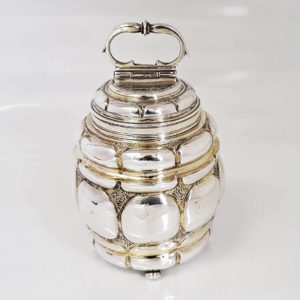
1675 - 1679
Marx Schaller
9789 Antique German Silver Tea Cannister
£6,500
A 17th century German parcel-gilt silver caddy of barrel shape. With a screw top lid and drop ring handle. Beautifully made and very tactile to hold. Suitable for tea and sugar. Raised on four ball feet, the box is decorated throughout with silver lobes against a matted gilt background. Weight 321 grams, 10.3 troy ounces. Height 11.5cm (to the top), 15cm (to top of handle). Stamped on the top and underside of body with German silver marks and assay scrape for Augsburg, Germany. Maker Marx Schaller II. Circa 1675-79. See Rosenburg German silver marks for Augsburg page 127.
-

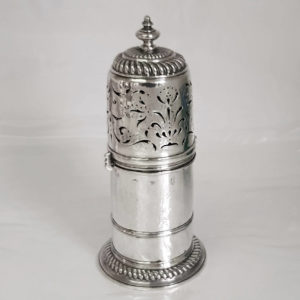
1696
St John Hoyte
9964 William III Antique Silver Caster
Sold
A late 17th century antique sterling silver muffineer in the traditional lighthouse design with a bayonet fitting, so typical of these very early casters. Excellent size and heavy quality, it feels good in the hand. Lovely patina. The base is plain styled with a gadrooned base, the top is simply pierced, the holes are quite large as crushed loaf sugar was still in use at this early date. Uninscribed.Weight 304 grams, 9.7 troy ounces. Height 19.5cm. Diameter of base 6.3cm. London 1686. Makers mark for St John Hoyte. Sterling silver
-

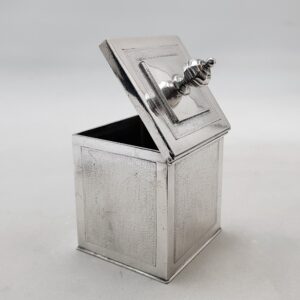
1704
Thomas Parr
10352 Queen Anne Antique Silver Tea Caddy
Sold
An extremely rare collector’s item dating to the early 1700’s. This unique little silver tea box of cube form has a hinged lid with octagonal finial. The hand applied matted work is very specific to the 1680-90 period. The small size is due to the rarity of tea at this early date. Weight 203g, 6.5 troy oz. Height 9cm (finial), 7cm. Top measures 6.3cm square. London 1704. Maker Thomas Parr I. Britannia standard silver.
-

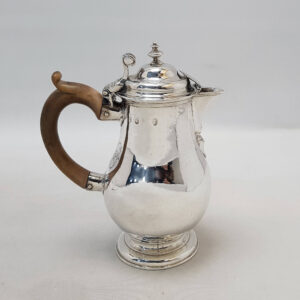
1707
Benjamin Pyne
10294 Queen Anne Antique Silver Milk Jug
£4,750
A rare little antique covered milk jug having a hinged lid and spout with hinged cover. Britannia standard silver*. This is one of the earliest forms of milk jug and the style is very much like a contemporary coffee pot. Simple plain design and very pretty wooden handle. Hand engraved below the spout with a lion crest and duke’s coronet, and between the handle sockets with an earl’s coronet above a cypher. Contains 400 ml.
Weight 448 grams, 14.4 troy oz. Height 17.2cm. Spread 14cm. London 1707. Benjamin Pyne -

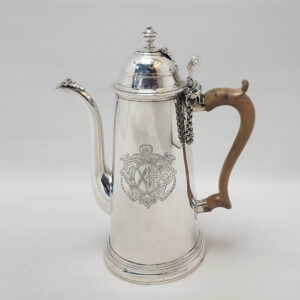
1707
John Barnard
10295 Queen Anne Antique Silver Chocolate Pot
Sold
A good early antique silver chocolate pot of tapering cylindrical form, domed lid typical of the period, and an attractive scrolling wooden side handle. The top finial is hinged so that the chocolate can be stirred by inserting a swizzle stick and the cover detaches via a removable pin and chain for cleaning. The spout has a hinged flap. Hand engraved to the front is an armorial for the FITZGERALD family within a decorative cartouche. Contains 950 ml. Weight 608 grams, 19.5 troy oz. Height 24.5cm. Spread 19.5cm. London 1707. John Barnard I. Britannia standard silver*. 18th century.
-

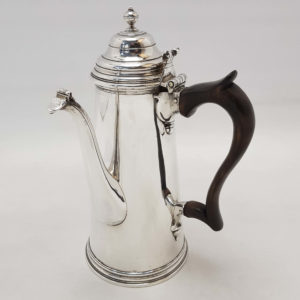
1713
Anthony Nelme
10218 Queen Anne Antique Silver Coffee Pot
£5,750
A rare early antique silver coffee pot with straight tapering sides and domed lid typical of the period. Wooden side handle. Large size and good weight. A nice feature is the little hinged flap on the end of the spout. Contains 1200ml. Weight 930 grams, 29.9 troy ounces. Height 26cm. Diameter of base 11.4cm. London 1713. Maker Anthony Nelme. Britannia standard silver.
-

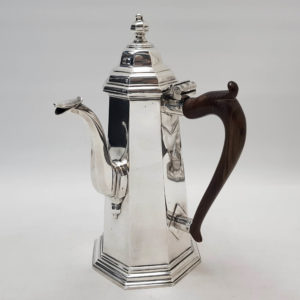
1715
Martin Stockar
10165 Antique George I Silver Coffee Pot
£10,750
An early antique silver coffee pot (or chocolate pot) with domed lid and beautifully grained fruit wood side handle. The elegant plain style, with simple reed borders, has the straight lined octagonal shape which is a very rare and desirable feature. The decorative strapwork handle supports are also functional as Britannia standard silver is purer and therefore a softer silver. Contains 1000ml. Weight 1098 grams, 35.3 troy ounces. Height 26.6cm. Diameter 15.25cm (widest point of body). London 1715. Maker Martin Stockar. Britannia standard silver.
-

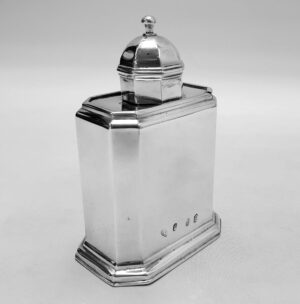
1718
John Farnell
10303 George I Antique Silver Tea Caddy
Sold
A good early English silver caddy of plain rectangular design with the plain hexagonal design typical of the early 1700’s. The sliding top has a lift off cap which doubles as a tea measure. Weight 226 grams, 7.2 troy ounces. Height 12.6cm. Base 8.9 x 5.8cm. London 1718. Maker John Farnell. Britannia standard silver – purity 95.8%*. 18th century.
-

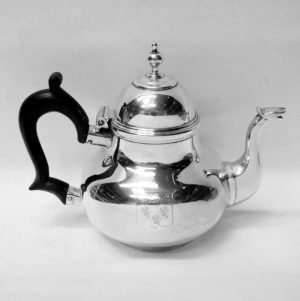
1719
Richard Bayley
9137 George I Silver Teapot
Sold
A rare early English silver teapot of simple plain form. Britannia standard silver*. Pear shaped with domed hinged cover and original wooden handle. Hand engraved to the front is a coat of arms – argent, six Lions rampant, sable – within an incised shield, possibly for the Savage family. Early teapots were of small capacity because of the rarity of tea. Contains 570 ml. Weight 425 grams, 13.6 troy ounces. Height 14 cm. Spread 19 cm. London 1719. Maker Richard Bayley.
-

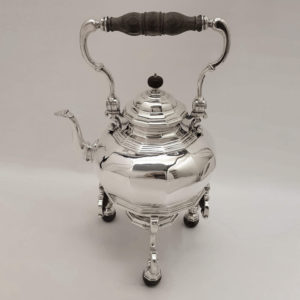
Circa 1720
Paul de Lamerie
9720 George I Silver Tea Kettle
Sold
A large and imposing antique silver samovar of plain design having a wooden swing handle and 12-sided baluster design. By the sought after Huguenot silversmith Paul de Lamerie. Britannia standard silver*. Very heavy gauge silver. The matching burner stand has carrying handles and stands on large wooden ball feet; it has a removable burner well with push on top and flip cap for the wick. Excellent colour and hand hammered finish. A nice feature is the hinged cover to the pouring spout. Engraved with a crest and name “Riversdale W.G”. Weight 3696 grams, 118.8 troy ounces. Total height 44cm (handle extended). London circa 1720. Maker’s mark stamped 4 times for Paul de Lamerie (Britannia mark).
-

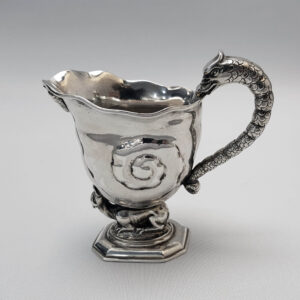
Circa 1720
David Willaume
10362 George II Antique Silver Jug
Sold
An interesting little antique silver cream jug formed of an auricular shell with a ribbed serpent scroll handle and raised on a dragon support. Exquisite workmanship and very heavy gauge silver. Faint traces of original gilding. Contains 75ml. Weight 252g, 8.1 troy oz. Height 10.4cm (top of handle)/9cm (lip). Spread 10.8cm. Foot 5.3 x 4.1cm. Unmarked silver. Probably David Willaume. Circa 1720.
-

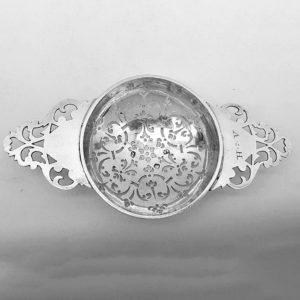
1722
John Albright
9942 George I Antique Silver Strainer
Sold
A rare early English antique sterling silver strainer of circular form with decorative side handles. A very charming and useful size; although originally made as a lemon strainer this could be used nowadays as a tea strainer. The bowl is pierced with a design of scrolls and other motifs and contemporary owner’s initials are engraved to one handle. Weight 75 grams, 2.4 troy oz. Spread 16.8cm. Diameter 8.5cm. Height 2.9cm. London 1722. Maker John Albright. Sterling silver
-

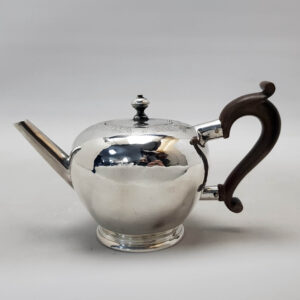
1731
William Darker
10332 George II Antique Silver Bullet Teapot
Sold
A very charming antique silver teapot of small size and globular form. With a plain body, straight spout, and wooden handle. The engraved decoration to the top has a circular band of hatching interspersed with shells, faces and scrolls. Hand engraved to the front is a crest of a swan. Excellent colour and traces of the original hammered finish. Contains 300ml. Weight 277g, 8.9 troy oz. Height 10.5cm. Spread 17.3cm. London 1731. Maker William Darker. Sterling silver.
-

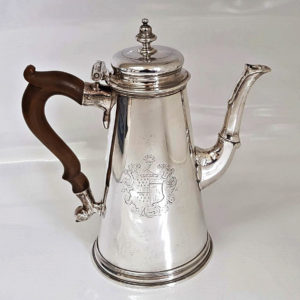
1733
Robert Lucas
9753 George II Silver Coffee Pot
£1,950
A good plain style antique silver coffee pot with straight tapering sides and a shallow domed lid. To the front is a contemporary hand engraved armorial within a decorative cartouche. Good gauge silver and excellent colour. Contains 640 ml. Weight 699 grams, 22.4 troy ounces. Height 20cm. Spread 19cm. London 1733. Maker Robert Lucas. Sterling silver.
-

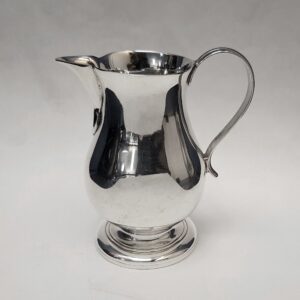
1734
Richard Gurney And Thomas Cooke
10341 George II Antique Silver Jug
£785
A pretty little silver sparrow beak jug with a compact body and spreading foot. Good plain style. Good patina. Weight 58 grams, under 2 troy oz. Height 7.7cm. Spread 6.8cm across the top. London 1734. Maker Thomas Cooke & Richard Gurney. Sterling silver.
-

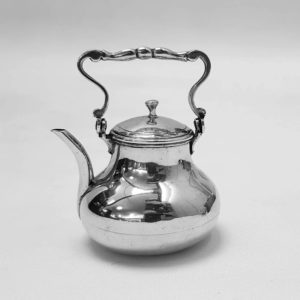
1737
Willem Van Strant
10116 Antique Dutch Silver Miniature Teapot
£1,250
A Dutch silver toy teapot of pear shaped form with swing handle and detachable lid. Very good condition. Excellent patina. Weight 45 grams, 1.5 troy ounces. Height 5.5cm (to top of handle), 4.4cm (to top of knob). Made in Amsterdam, Netherlands. Date mark “C” for 1737. Maker Willem Van Strant.
-

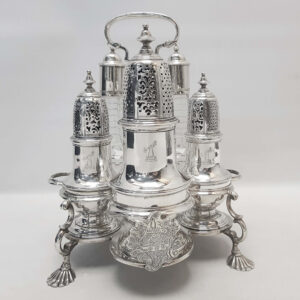
1738
Samuel Wood
10327 George II Silver Warwick Cruet
£3,350
A handsome antique silver cruet set with a matching set of 3 silver casters and 2 silver and faceted crystal oil and vinegar bottles. The cinquefoil frame has 4 shell feet and a shaped decorative cartouche to the front with a hand engraved armorial. Each caster and bottle bears the same matching crest. Total weight of silver 1288 grams, 41.4 troy ounces. Caster height 17.75cm and 14cm. Bottle height 17cm. London 1738. Maker Samuel Wood, known for his silver casters.
-

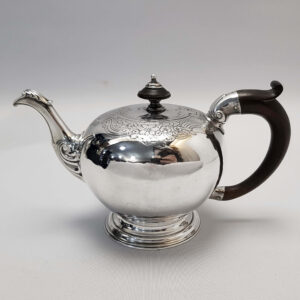
1742
Thomas Farren
10373 George II Antique Silver Teapot
£2,750
An antique silver bullet shape teapot with the small size typical of the early date. Lovely plain shape with a curved spout and engraved decoration to the upper body. The lid has a good quality inset hinge. Contains 520ml. Weight 472g, 15.2 troy oz. Height 11.5cm. Spread 20.2cm. London 1742. Maker Thomas Farren. Sterling silver.
-

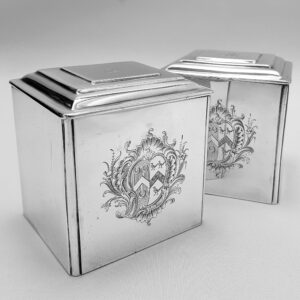
1746
John Swift
10388 George II Pair of Antique Silver Tea Caddies
£5,850
An exceptional pair of rectangular silver tea cannisters with stepped hinged lids and canted corners. The plain form, almost cubic, is very attractive. To the front of each is an expansive hand engraved armorial for Martin within a decorative cartouche, the covers have a crest. Total weight 805g, 25.8 troy oz. Height 9.6cm. Width 9.2cm. Depth 8.4cm. London 1746. Maker John Swift. Sterling silver.
-

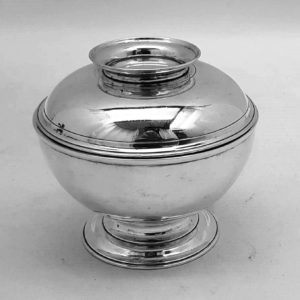
1748
Samuel Taylor
9867 George II Covered Sugar Bowl
Sold
A rare antique sterling silver covered sugar bowl of circular form on a small spreading foot. Excellent plain design, typical of the period. Good colour. In the early 18th century sugar bowls or sugar boxes nearly always had covers which, when reversed, could be used as a saucer or spoon tray. Weight 219 grams, 7.0 troy ounces. Total height 9cm. Bowl diameter 9.7cm. London 1748. Maker probably Samuel Taylor a specialist tea caddy and sugar bowl maker.
-

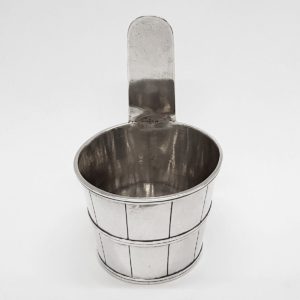
Circa 1750
Lawrence Jones
9522 Antique Silver Piggin
£550
A delightful antique sterling silver cream pail or piggin in the traditional form of a milking pail or bucket with coopered decoration. It has a single raised handle with a hanging bracket to the reverse to suspend the little bowl from possibly the sugar bowl. Weight 37 grams, 1.1 troy ounces. Height 4.3 cm (7 cm to top of handle). Diameter 4.3 cm. London circa 1750. Makers mark only for Lawrence Jones.
-

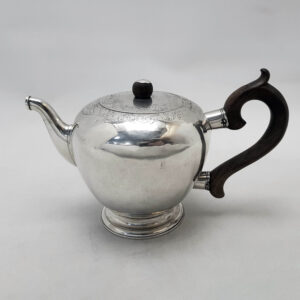
Circa 1750
Pierre de Moliere
10310 George II Antique Silver Teapot
£3,750
A charming little bullet shaped teapot of plain simple form with a shaped panelled spout and wooden handle. Elegant small size. The bullet shaped teapot is typical of the George II period and this Swiss example shares all the quality characteristics including an inset hinge and cast silver foot. The lid is finely hand engraved with fruit, flowers and foliate scrolls. Contains 460ml. Total weight 368 grams, 11.8 troy ounces. Height 12.2cm. Spread 19cm. Lausanne, Switzerland. Circa 1750. Maker Pierre de Moliere.
-

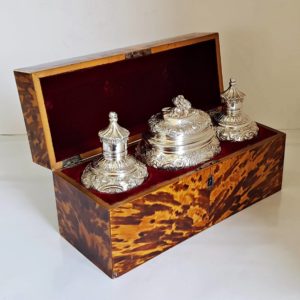
1751
John Jacob
9784 George II Silver Caddies in a Box
£11,750
A stunning quality set of antique silver tea caddies and covered sugar bowl in a later fitted lockable tortoiseshell box with silver mounts. Very heavy gauge, cast silver. The deeply embossed and chased silver decoration is particularly attractive and each piece has a cartouche with a lion crest to the front. The two baluster shaped caddies, for green and black tea, have lift off tops. The bowl has a hinged lid with a bouquet of flowers finial. Total weight of 3 boxes 1,373 grams, 44 troy ounces. Tea caddy height 16.5cm. Sugar bowl height 15.5cm. London 1751. Maker John Jacobs, of Hugeunot origin. The box handle is hallmarked for London 1805, maker “JS”. Sterling silver.
-

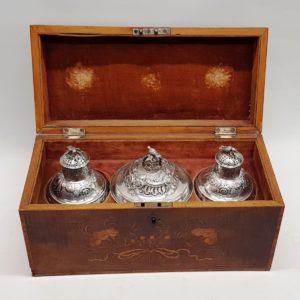
1752
Samuel Herbert And Company
9504 George II Silver Caddies in a Box
£6,750
An excellent quality pair of antique sterling silver tea caddies and matching covered sugar bowl with gilt interior. All with cast silver bird finials and contained in a fitted Sheraton period wooden box with coloured flower and foliage inlays. The deeply embossed and chased silver decoration is particularly attractive and each caddy has a fine hand engraved coat of arms to the front. Heavy weight. The two caddies, for green and black tea, have the original lift off tops now drilled with holes to convert them into sugar shakers (muffinieres). Total weight of 3 boxes 882 grams, 28.3 troy ounces. Sugar casters height 15.5cm. Sugar bowl height 14cm, diameter 10.3cm. London 1752. Maker S Herbert & Co..
-

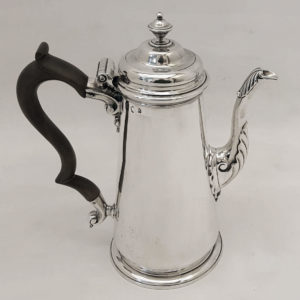
1752
John Swift
9969 George II Antique Silver Coffee Pot
£1,650
An antique sterling silver coffee pot with a straight sided, slightly baluster form raised on a shallow pedestal foot. Good quality shaped wooden handle. Elegant plain design and graceful shaped spout. Contains 980 ml. Weight 776 grams, 24.9 troy ounces. Height 24cm. Spread across spout and handle 21cm. London 1752. Maker John Swift.
-

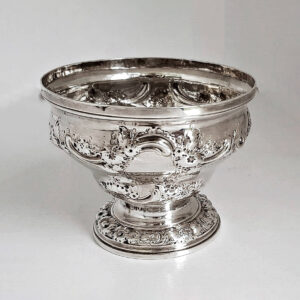
1754
Samuel Taylor
9723 George II Silver Sugar Bowl
£675
An antique silver bowl with extensive embossed decoration of flowers, leaves and scrolls. To the front is a rococo design cartouche – uninscribed. Superb quality and heavy gauge silver. No lid. Weight 222g, 7.1 troy oz. Height 8.4cm. Diameter 10.5cm
. London 1754. Maker Samuel Taylor. Sterling silver. -

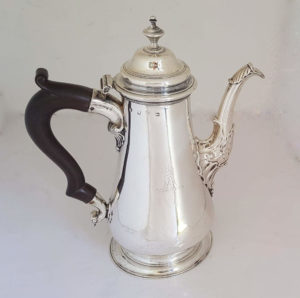
1754
James Williams
9847 George II Silver Coffee Pot
£2,650
This excellent pot, of graceful form, is also extremely large and heavy. A handsome antique silver coffee pot of baluster form raised on a shallow pedestal foot. Elegant plain design and graceful shaped spout. To the front there is a hand engraved lion crest within a large decorative cartouche, to the reverse there’s a dog crest. Contains 1650 ml. Weight 1313 grams, 53 troy ounces. Height 30.2cm. Spread across spout and handle 26.3cm. London 1754. Maker James Williams. Sterling silver.
-

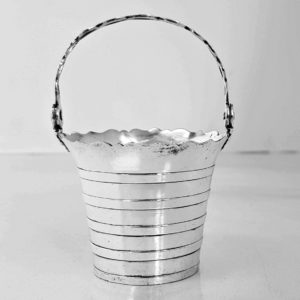
Circa 1760
Walter Brind
8117 George III Silver Cream Pail
£550
A delightful antique sterling silver cream pail or piggin. Traditional design in the form of a milking pail or bucket with coopered decoration. The swing handle is formed from 2 intertwined strips of silver. Contains 70 ml. Weight 77 grams, 2.4 troy ounces. Height 5 cm (9.5 cm to top of handle). Diameter 6.6 cm. Makers mark only for Walter Brind. London circa 1760.
-

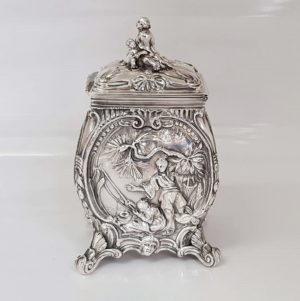
1761
Emick Romer
9755 George III Silver Chinoiserie Tea Caddy
Sold
A fine example of an antique silver caddy box of bombe form with a side hinged lid and standing on scrolling feet. The sides are embossed with charming scenes of Chinese daily life. The lid finial is in the form of a mother and baby. Weight 366 grams, 11.7 troy ounces. Height 16cm. Body measurements at maximum – width 9.2cm, depth 8cm. London 1761. Maker Emick Romer. Sterling silver.
-

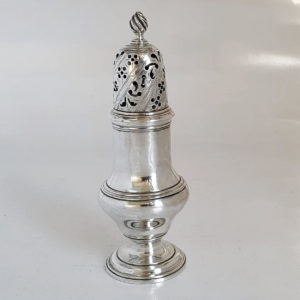
1766
Richard Palmer
8293 George III Silver Caster
£450
A plain style antique silver castor with pierced top and spiral finial. Solid chunky weight and feels good in the hand. The top is fitted with an inner lining to reduce the size of the holes making the caster more suitable for modern day (finer ground) condiments. Weight 177 grams, 5.6 troy ounces. Height 14.8 cms. London 1766. Maker Richard Palmer. Sterling silver.
-

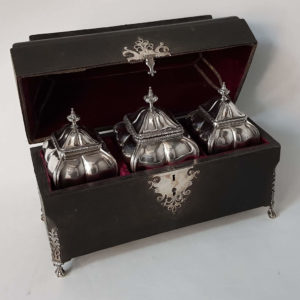
1766
Edward Aldridge
9826 George III Silver Caddies in a Box
£7,850
An exceptional set of antique silver tea caddies and covered sugar bowl in a black shagreen box with silver mounts. Excellent quality and classic styling. The bombe form tea boxes have lift off lids with gadroon borders; the decorative cast bases have applied acanthus mounts above to all sides. The two square shaped caddies are for green and black tea; the rectangular caddy is for sugar. The shagreen box has a red velvet interior; the exterior has beautifully ornamented silver mounts, the handle is hand engraved with a crest. Total weight of 3 boxes 858 grams, 27.5 troy ounces. Square caddy height 15cm base 8.5 x 7.5cm. Rectangular caddy height 16.5cm, base 9.5 x 8.5cm. London 1766. Maker Edward Aldridge. The box silver maker is “IW”. Sterling silver.
-

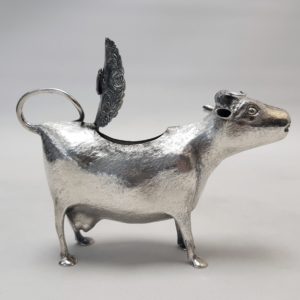
1767
John Schuppe
10245 George III Silver Cow Creamer
£7,500
An antique silver cream jug in the form of a model cow. The cavity below the lid is filled with cream which is poured out through the cow’s mouth using the curled tail as a handle. Simple figuring and naive expressive face. The body is all over chased with a charmingly realistic hairy finish. Weight 143 grams, 4.5 troy ounces. Spread 14.7cm. Height 9.2cm (top of horns). London 1767. Maker John Schuppe. Sterling silver. 18th century.